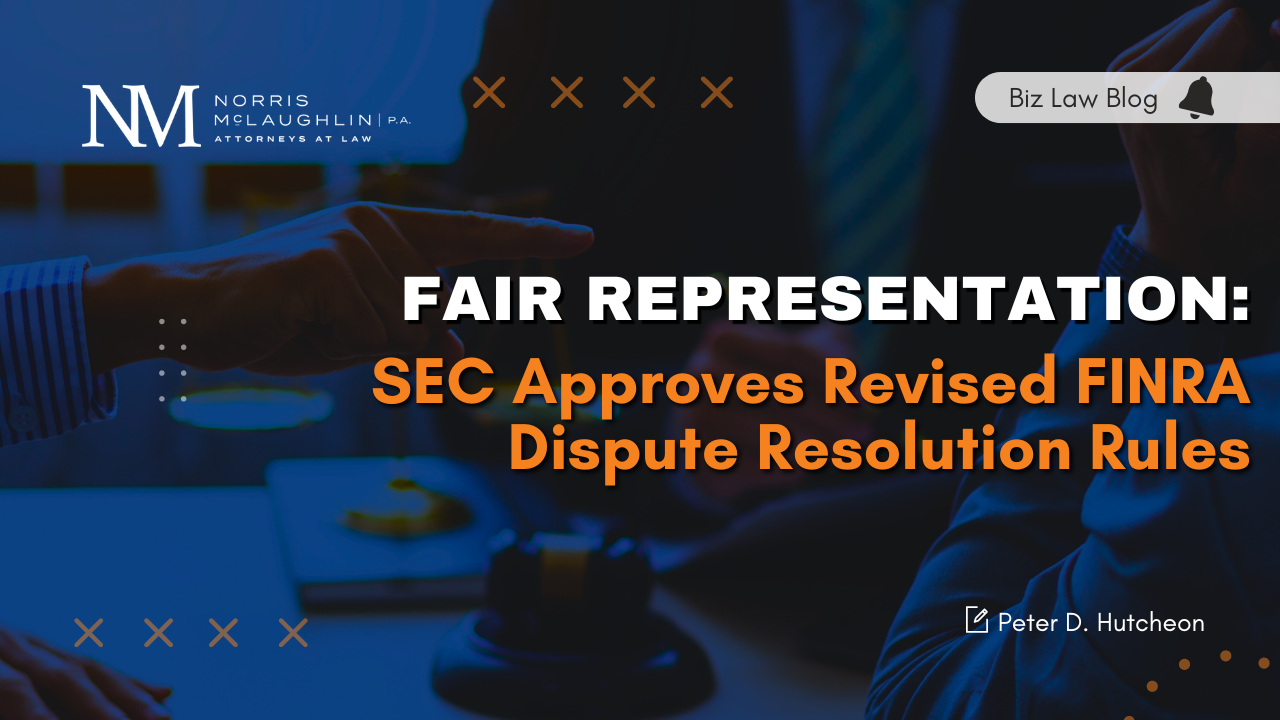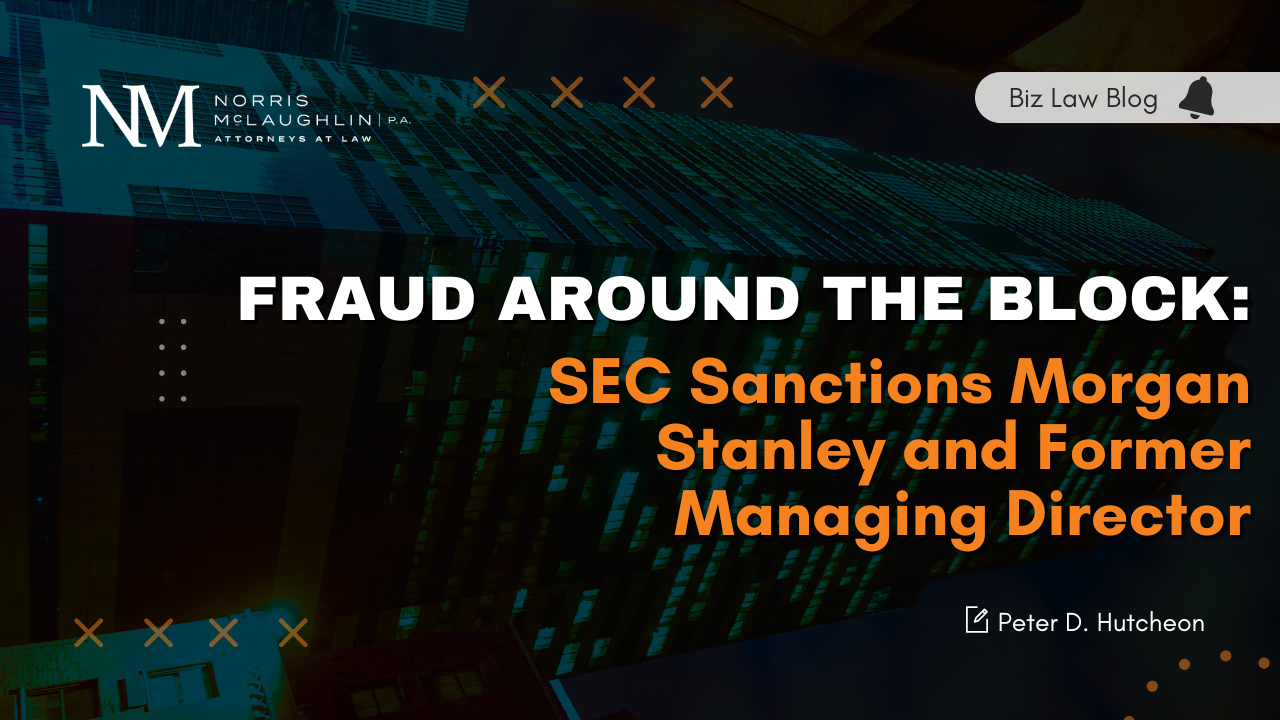The Price Is “Wrong”: SEC Sanctions Pharma Company for Faulty Rebates

Multiple sclerosis (“MS”) is a long lasting, chronic, and truly terrible disease of the central nervous system. MS will cause ever-increasing disability and, in some cases, can lead to death. It is the most common neurological disease of young adults. According to the National Institutes of Health (“NIH”):
MS attacks axons in the central nervous system protected by myelin, which are commonly called white matter. MS also damages the nerve cell bodies, which are found in the brain’s gray matter, as well as the axons themselves in the brain, spinal cord, and optic nerves that transmit visual information from the eye to the brain. As the disease progresses, the outermost layer of the brain, called the cerebral cortex, shrinks in a process known as cortical atrophy.
One type of MS is known as relapsing-remitting MS, which features sudden and disabling attacks, followed by remission until the next attack occurs. Medical researchers learned that these attacks could be lessened by treatment with an injection of a repository corticotropin, which according to Wan, Niewoehner, and Hayes (2023) on the NIH’s National Library of Medicine , “is a naturally sourced complex mixture of adrenocorticotropic hormone analogs and other pituitary peptides.” This complex mixture is used to treat patients with serious and rare inflammatory and autoimmune conditions.
Acthar, a version of this complex mixture, was developed by Questcor Pharmaceuticals, Inc. (“Questcor”). In 2014, Questcor was acquired by Mallinckrodt PLC (“Mallinckrodt”), a pharmaceutical company with origins in the 1840s outside of St. Louis, Missouri. It incorporated in Missouri in 1882, and in 2013, it reincorporated in Ireland and moved its headquarters to Dublin. Mallinckrodt has historically been involved in several specialty chemical areas, including becoming the leading producer of anhydrous ammonia for the photography industry and becoming the sole purifier of uranium for use in the Manhattan Project in 1942. Over time, Mallinckrodt also developed, sold, and became a leading producer of the pain-killer oxycodone.
In addition to its corporate headquarters in Dublin, Mallinckrodt has executive offices in Webster Grove, Missouri, and Bridgewater, New Jersey. Mallinckrodt’s securities were first sold to the public in 1954 and are traded on the New York Stock Exchange. Those securities are registered under Section 12(b) of the Securities Exchange Act of 1934, as amended (the “1934 Act”). Its net sales for 2022, according to its Annual Report on Form 10-K filed with the SEC in February 2023, totaled some $1,040,000.
According to a Nov. 30, 2023 Order Instituting Cease-And-Desist Proceedings (the “Order”) issued by the U.S. Securities and Exchange Commission (“SEC”) against Mallinckrodt:
[Acthar] was Mallinckrodt’s most important product, generating nearly $6 billion in net sales between 2014 and 2019 and comprising approximately one-third of the company’s annual net sales in 2017, 2018, and 2019.
Approximately 10% of Acthar sales were to Medicaid patients through the Medicaid Drug Rebate Program (“MDRP”), which is administered by the [Centers for Medicare and Medicaid Services (“CMS”)]. To ensure that state Medicaid programs generally pay the lowest prices for drugs, the MDRP requires pharmaceutical manufacturers to rebate back to state Medicaid programs a certain percentage of each sale of any drug sold to a Medicaid patient. The rebate rate is calculated according to a formula set by statute.
In 2012, Questcor had requested that CMS change the rebate formula for Acthar sales to Medicaid patients, purportedly based on an approval by the U.S. Food and Drug Administration for a new indication for the drug. CMS permitted the change, which significantly lowered the number of rebates paid on Acthar sales to Medicaid patients and increased net sales revenue by some $90 to $100 million per year.
In April 2016, the CMS notified Mallinckrodt that the rebate formula was incorrect. Under its contract with the CMS, Mallinckrodt was obligated to correct the past rebate error, i.e., pay approximately $250 million for the past errors as well as increasing rebates in future years by $90 to $100 million. Mallinckrodt did not correct the rebate shortfalls.
In November 2018, CMS sent a letter to Mallinckrodt requiring repayment of the shortfalls, which by then totaled more than $500 million. CMS demanded payment within 30 days, or Acthar would be designated “out of compliance” – meaning that no further sales of Acthar to Medicaid patients would be permitted. CMS also noted that it was considering referring the claim to both the Department of Justice and the Department of Health and Human Services.
In May 2019, Mallinckrodt first disclosed the CMS claims when it filed a lawsuit against CMS disputing those claims. In June 2020, after Mallinckrodt lost at trial and its appeal was pending, the company recorded in its financial statements a total liability of $640 million. The Order notes that after that information became public, Mallinckrodt’s stock price dropped some 25%. The CMS litigation also led the U.S. Attorney for the District of Massachusetts to initiate a False Claim Act investigation concerning the 2012 change in the rebate amount by issuing a Civil Investigative Demand (“CID”) to Mallinckrodt in January 2019.
Mallinckrodt did not disclose either the implications of the CMS claims or the full nature of the False Claims Act investigation in its Annual Report on Form 10-K for 2018 (filed with the SEC on Feb. 26, 2019) or on its Quarterly Report on Form 10-Q for the first quarter of 2019 (filed May 7,2019). On Oct. 12, 2020, Mallinckrodt filed a petition for bankruptcy under Chapter 11 of the Federal Bankruptcy Act in the Federal Court in Delaware. On June 16, 2022, Mallinckrodt’s reorganization plan was confirmed, and it emerged from bankruptcy.
As noted above, Mallinckrodt was also a major producer of opioid pain medication. In 2017, the company paid a $35 million fine to the Drug Enforcement Agency for its over-aggressive marketing of oxycodone. Subsequently, Mallinckrodt was sued by Florida and several other states for the wrongful distribution of oxycodone eventually reaching a $1.3 billion settlement in 2020. Concern by lenders (which had helped fund the company’s 2022 confirmed bankruptcy plan) that the company would not be able to make a $200 million oxycodone settlement payment due that year caused Mallinckrodt to file again to reorganize under Chapter 11. Mallinckrodt’s “second Chapter 11 plan was confirmed on October 10, 2023.”
The Order notes that Mallinckrodt’s Annual Report for 2018 and Quarterly Report for the First Quarter of 2019 “contained material misstatements and omissions.” There was no disclosure of the magnitude of the loss contingencies inherent in the CMS claims “that Mallinckrodt was underpaying Medicaid rebates on sales of Acthar.” The Commission pointed out that “[u]nder… GAAP [the Accounting Standards Codification for loss contingencies] a public company is required to disclose material loss contingencies that are reasonably possible.”
By February 2019, Mallinckrodt knew the size of its potential liability for rebates due for past Acthar sales and the potential reduction in earnings arising from future Acthar sales with the increased rebate amount. Further, the company’s disclosure of the CID failed to note that it was a False Claim Act investigation concerning the company’s most important product, as well as the potential liability for underpayment of millions of dollars in rebates.
The Company attempted to negotiate some kind of settlement with CMS after the November 2018 CMS demand letter, but without success. CMS sent a final demand letter on May 10, 2019, after which Mallinckrodt sued CMS. In March 2020, the U.S. Attorney for Massachusetts unsealed a False Claims Act complaint against Mallinckrodt asserting that the information provided to CMS by Questcor in 2012 to obtain the reduced rebate amount was knowingly false. Later in March 2020, the Federal District Court hearing the company’s suit against CMS granted CMS summary judgment and ordered the company to:
- go back to the original rebate amount; and
- pay over $600 million for the underpayments.
As part of Mallinckrodt’s first bankruptcy plan, the company agreed to pay $234.7 million to settle both the CMS claims and the False Claims Act liabilities. During the period between May 2016 and March 2019, Mallinckrodt was offering securities to its employees under a stock purchase program pursuant to registrations on Form S-8 (filed May 4, 2016, and again on 12 Mar. 12, 2019). The Order notes that Mallinckrodt did have both a disclosure committee and a written policy requiring that possible loss contingencies be evaluated. However, the Acthar rebate issue was never the subject of either a loss contingency analysis or a disclosure committee review; the Order noting that the Acthar rebate issue was “never submitted to or considered by the disclosure committee before” filing the materially misleading 10-K and 10-Q.
Not surprisingly, the SEC found that Mallinckrodt had violated the federal securities laws, namely:
- Section 17 (a)(2) of the Securities Act of 1933, as amended (the “1933 Act”) for selling securities using statements that are materially misleading or contain material omissions;
- Section 17(a)(3) of the 1933 Act for engaging in fraud in connection with securities sales;
- Section 13(a) of the 1934 Act and Rules 12b-20, 13a-1, and 13a-13 thereunder for failing to file periodic reports which were free of material misstatements or omissions;
- Section 13(b)(2)(A) of the 1934 Act for failing to keep accurate books and records;
- Section 13(b)(2)(B) of the 1934 Act for failing to design and maintain a sufficient system of internal accounting controls; and
- Rule 13a-15(a) under the 1934 Act for failing to file required disclosure reports and maintain appropriate disclosure controls and procedures.
As a result of these findings, the Commission ordered that Mallinckrodt cease-and-desist from any future violations of the cited Sections and Rules. It also ordered the company to engage a consultant, acceptable to the SEC, to review the adequacy of Mallinckrodt’s policies and procedures concerning disclosure controls and procedures AND internal accounting controls as required by GAAP. Mallinckrodt must provide a copy of the consultant’s engagement letter within 60 days after the date of the Order and a copy of the Consultant’s Report within 180 days. Mallinckrodt is to adopt each and every recommended revision or new policy and procedure within 180 days of the date of the Report, unless Mallinckrodt submits within 30 days a written objection to the Commission and the consultant of any recommendation that the company believes “unduly burdensome.” If no agreement is reached, the consultant’s recommendation must be implemented.
The consultant is to be an independent contractor, and no attorney-client or other privilege will attach to any communications between Mallinckrodt and the consultant. The consultant’s report(s) are to be kept confidential, unless disclosure is required:
- By court order;
- By agreement of the parties; or
- Is otherwise required by law;
- The Commission determines that disclosure would be in “furtherance of the Commission’s discharge of its duties and responsibilities.”
After completion of the consultant’s services, Mallinckrodt has 60 days to certify in writing to the SEC that the company has completed all the required corrective steps, providing appropriate supporting exhibits.
The Order notes that “[i]n determining …not [to] impose a penalty of $40,000,000, the Commission has considered [Mallinckrodt’s] financial condition and the undertakings” concerning the consultant. One may also wonder if the importance of Acthar to MS patients, as well as the importance of other Mallinckrodt pharmaceutical products, may have been a consideration in not causing the financial “death” of Mallinckrodt. Still, it is somewhat more than ironic that Mallinckrodt’s website unreservedly asserts:
For more than 150 years, we have remained focused on producing quality products with the utmost integrity and unparalleled service in order to better serve the patients, customers and communities in which we live and work... These Values are Patient-Centric, Integrity, Innovative and Collaborative.
One may question whether Mallinckrodt needs more than one short term of consultant overview, given its history of aggressive marketing of painkillers in the face of deadly consequences and an inability to engage honestly with either the federal government or the company’s own shareholders. Fixation on increasing profits and avoiding taxes may sometimes be less than the right way to guide a corporate “person.” That fixation is, at least, almost certainly an inducement to err, in more than just pricing.
If you have any questions or concerns about the SEC or potential fraudulent or misleading business actions, please do not hesitate to contact me at pdhutcheon@norris-law.com.




